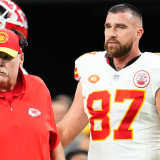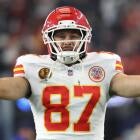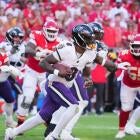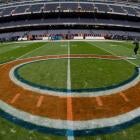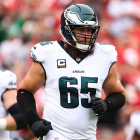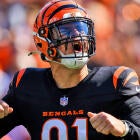The Chronicles of Favre-ia: Brett Favre's backups go deep on life with the incomparable No. 4
Whistling rocket balls, locker room laughs, mad-cap comebacks and the NFL's greatest tough-guy streak
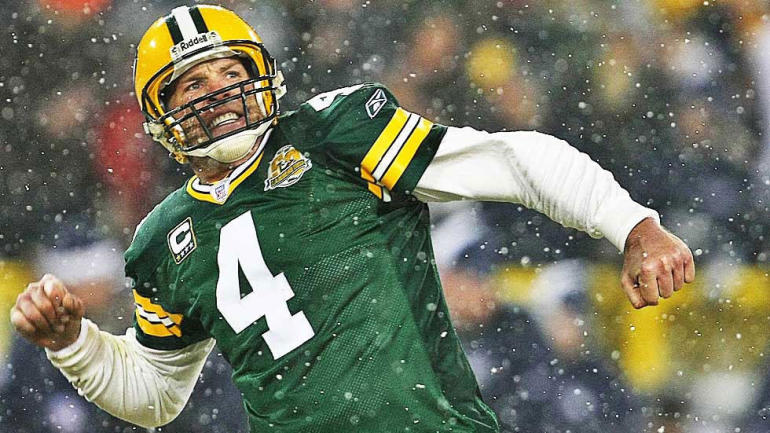
The list starts with a "Majik Man" and ends with a journeyman. There's a McMahon somewhere in there, too, along with two Heisman Trophy winners and two other QBs to start Super Bowls -- or three, if you count Kurt Warner, a Packers camp arm in 1994 who never made the final roster cut.
The one constant in this motley fraternity of quarterbacks?The indestructible Brett Favre, who kept each and every one of them on the sideline while making 321 consecutive NFL starts, playoff games included, over 19 seasons.
Like Favre's streak, the list of passers who backed him up is long and distinguished.
Don Majkowski, aka the "Majik Man," was runner-up to Joe Montana in the 1989 MVP vote before giving way to Favre-mania when he rolled his ankle in the third game of the 1992 season. Ty Detmer, winner of the 1990 Heisman Trophy, landed in Green Bay as a ninth-rounder in 1992. Mark Brunell, a fifth-round pick of the Packers, started 151 games in the NFL and piloted the Jaguars to two AFC title games after he left Favre's side.
Jim McMahon, the "Punky QB" who shuffled to a Super Bowl with the 1985 Bears, spent his final two seasons backing up Favre and got another ring to show for it. Doug Pederson, Favre's backup for seven seasons, is now the Chiefs offensive coordinator.
There was also Steve Bono, a 15-year NFL veteran with a 28-14 record as a starter, and Danny Wuerffel, the 1996 Heisman winner. Both spent a season in Green Bay. Also in the club: little-remembered guys like T.J. Rubley, Ingle Martin, Craig Nall, J.T. O'Sullivan, Sage Rosenfels and Joe Webb. Tarvaris Jackson, mostly a career backup, finally replaced an injured Favre in the Vikings' starting lineup in Week 8 of the 2010 season.

Then there are the guys still playing: Chargers backup Kellen Clemens, Favre's understudy in his one season as a Jet, and Matt Hasselbeck, who on Sunday joined Favre in another exclusive club as the only two QBs to win four consecutive regular-season games in a season at the age of 40.
And, of course, Aaron Rodgers, the guy who finally took over for Favre in Green Bay in 2008, and who has done pretty well for himself since.
All of them had a front-row seat for one the greatest feats in sports: Favre's weekly hair-on-fire assault of the NFL record books.
Bumps. Bruises. Broken bones. Separated shoulders. Torn ligaments. Rolled ankles. Concussions.
Favre battled through enough injuries to fill a medical encyclopedia to make each week's start, often playing some of his best football when he hurt the most.
"I was a part of games where he would break a finger or tweak a knee and you'd think he wasn't going to play the next week," Pederson said. "He'd roll an ankle and he couldn't practice on Wednesday, Thursday, sometimes even on Friday, but by Saturday he was ready to go and by Sunday you couldn't keep him off the field."
You also couldn't help but root for the guy. Favre's toughness inspired fierce loyalty among his teammates, while his practical jokes and spot-on impersonations, or his retelling of stories from his boyhood in tiny Kiln, Mississippi, would leave the locker room in hysterics.
As Favre nears entry into the greatest football clubhouse of all -- the Pro Football Hall of Fame -- we asked some of the card-carrying members of his backup club to paint a picture of the man, the myth and the legend.
You can't, as the saying goes, make this stuff up.
Ty Detmer, Packers backup QB, 1992-95: One of Brett's first plays when Don Majkowski got hurt, Brett goes in and his first play was an audible. It was like, What the heck, we never talked about that? Balls are flying everywhere, he was so wound up and going. Then at the end of the game, we're behind, two minutes left, and he throws a howitzer and hits Kitrick Taylor in stride for a touchdown. Nobody else in the league could've made that throw at that time. It was just a rope, about 45 yards down the sideline. That was cover 2, so he beat the safety. He threw it so flat that the safety never even touched Kitrick. It was just kinda one of those deals where it was like, Man, wow. And he was going nuts, the whole place is going crazy. That was the beginning.

Mark Brunell, Packers backup QB, 1993-94: One thing about Brett, you quickly found out that he liked to have a good time. In the meeting rooms, everything was very light. He wasn't a serious guy. But I can remember, in that first year, Brett Favre taught me as a young QB how you play the game at that level. On the field, he played hard.
Detmer: Here [Mike] Holmgren came from Joe Montana and Steve Young to Brett Favre. I'm sure he was thinking, like, "Man, what have I gotten myself into?" Early on, he was not one of those guys that was real professional in just the way he prepared and all those kinds of things, just kinda wingin' it. But he had a really strong arm. He had a lot of the tools that coaches are looking for and you knew he was probably going to take a little time to develop.
Steve Mariucci, Packers QBs coach, 1992-95, NFL Network Analyst: Patience is not one of Mike's virtues, OK? He wanted a Steve Young or a Joe Montana to play quarterback for us overnight. Whether it was Don or it was Brett or somebody else, he wanted excellence and he wanted great production right away and he was kinda spoiled that way.
Brunell: He'd start to do something crazy, and it wasn't just Mike, everybody would be like, "Brett, no! No! No! No! No!" And then all of a sudden, it's a touchdown pass, and it's like, "Yes!" That was early Brett Favre. Some of those no's stayed no's, though.
Detmer: He couldn't put a formation with the play together that first year. You never knew what formation was going to be called. I remember Sterling Sharpe was one of our veteran receivers and he would come off the field laughing. He was like, "You should've heard what he called that time."
Mariucci: In Atlanta he was running the Run and Shoot, which is a completely different offense than the West Coast offense, and he had very little experience or background in reading defenses, no experience with the system and what it entailed. We were basically starting from scratch.
Brunell: I've told this to a lot of people, but that was probably the most fun I ever had in a QB room because Brett would tell stories and nobody could tell a story like him. He's gotta be one of the funniest guys I've ever been around. I can remember Steve and Ty and myself just crying, laughing at Brett. As a young player, I just thought, "Man the NFL is great. This is it. Are you kidding me? We're not getting anything done, we're just telling stories and having fun and making fun of each other." It was priceless.
Detmer: One of our first blitz meetings, we would go in early Wednesday morning and the QBs would meet with the O-line coach, the RBs coach and the QB coach and go over teams' blitzes for that week and what our adjustments were. The O-line coach would be on the board, he'd say, "In the nickel, they like this blitz." Brett kinda leaned over to me and says, "What does nickel mean?"
Mariucci: Brett took over and Don wasn't coming back. I think Don's had 28 surgeries on that ankle. It was Brett, and we'd drafted Ty and eventually Mark, too. They were all young at the same time, too. They were all babies, so was I. I was a young NFL coach. That dynamic was probably beneficial for all of us because we kinda all grew up together.
Brunell: I tell you what, he used to drive Mike crazy. Mike would just be irate, and wanted to just get after Brett, which maybe he did behind closed doors. But as the starter, the head coach can't just completely dismantle your starter, especially when your starter is young and going through some growing process. Mariucci would always protect him.
Detmer: Mariucci was a really good buffer for Brett, because they could talk, they had a really good relationship. It was kinda good cop, bad cop. He really helped Brett grow and learn. There was never any really like, 'You're a dumbass, what are you doing?" That's not how Holmgren was. There was never anything mean about it. It was, "You gotta learn this, you're the guy."
Mariucci: Like I said, Mike wanted a Joe Montana or Steve Young playing quarterback for us. None of us were quite ready to do that. So, he would get mad. He would get really mad. I think some of the things that he learned from Bill Walsh was you yell at the coach and if the coach has any rapport with his players, then the players will try harder, just to keep the head coach off the assistant coach's butt. He got on me a lot. A lot. There was a good cop, bad cop relationship at times.
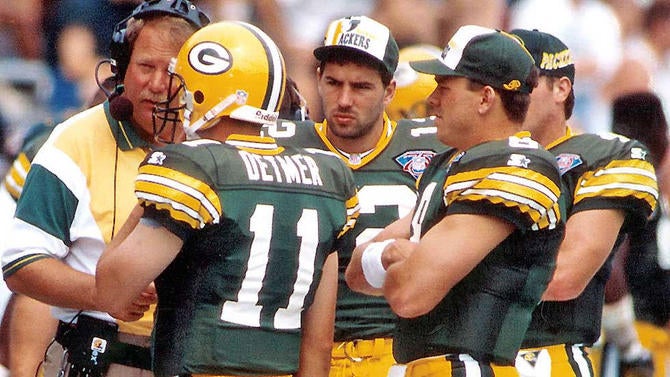
Brunell: Steve was definitely the buffer. He would defend him, go to bat for him, which a QB coach should do. I think I heard the story at some point that Holmgren had said to stop protecting him. And I'm not just talking about interceptions, I'm talking about bad interceptions. You know, falling down, throwing it up in the air, trying to make something happen. Just trying to use his arm strength to just power it through. This isn't Southern Miss. This isn't Division I football. This is the NFL and that stuff doesn't work. He relied so much on his strong arm to make something happen, which helped him at times, but was also his worst enemy at times.
Mariucci: I had to wear many hats, obviously, because Brett was a young country bumpkin that came up there by himself. I was coaching him, yeah, but I was living next to him, making sure that he was doing OK, doing all the right things, wasn't getting in trouble.
Detmer: Tim McGraw would come in for a concert, next thing you know after the concert he's hanging out at Brett's house. Then minicamps would come around, OTAs, one practice we start practice and Mariucci is like, looking around, "Where is he?" I was like, "I don't know. I don't hang out with him. That's not my deal." They'd start calling him, calling the house. About halfway through practice, Brett comes sprinting across the field, his hair's all messed up, he'd just gotten outta bed and you could still smell liquor on his breath. Holmgren was hot. Just real unprofessional. We're all out there practicing and here's your starting QB just getting out of a stupor … running out across the field.
Mariucci: I had my spies out. I would know. Not always where he was, or everything he was doing, but I knew a lot. I had people. Green Bay is a small town. I had people call me, they'd call me and go, "All right coach, your guy is behind the bar serving drinks tonight." I'd say, "How's he doing?" "Well, he's having a good time." And I'd say, "Well, just tell him to get home safe and I'm watching." Even though he was our starter, he still liked to be a kid and have a good time. And, of course, Frankie Winters, old Joey Bag 'o Donuts, and Chmura and those guys, they had a good time. There were no cell phones, right?
Detmer: I can tell you in Year 3, it was wearing a little thin. Brett was leading the league in picks, still kinda doing the same antics and it was wearing on the coaches. I think both Mark and myself were cerebral guys that understood it and would not take the chances Brett would. I knew Mark would make the check down, was real efficient. It seemed like there were some divisions in the coaching staff.
Brunell: I heard about it down the road that they had at least had a conversation about making a switch. Nobody ever told me, Mooch never told me, "Hey, make sure you're ready." I don't remember that, it might've happened.
Mariucci: Mike Holmgren had an open forum with our coaching staff about, "Should we make a switch? Should we try Ty or try Mark. They're good young quarterbacks, too, maybe they can do the job. Maybe it will get Brett's attention." I remember it very well. We went all around the table, every coach had a vote.
Detmer: A couple of coaches were pulling for Mark, a couple wanted to stay with Brett, maybe a couple wanted to see me in there. It was a weird feeling there, and I think Brett could sense that.
Brunell: I think they might've taken a vote, and obviously Mike's vote counts more than anything. Some coaches we're for change, some were not. I really don't know the specifics, but I mean you can tell. I wasn't there for very long, but you could tell something was going on and he wasn't playing well. It just was bad.
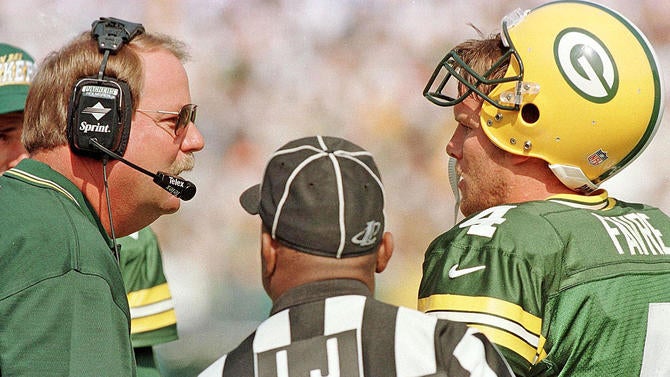
Mariucci: I also remember Brett coming into me before he went home to Mississippi. It was our bye week. He went home to just chill. Just to kinda get away from it for a little bit, to get his mind straight for the bye week. He came in and he was so emotional and so distraught. I remember he was fired up and he was yelling and he was funny. He was funny as all get out. And he said, "I just want to be the best quarterback in the league. That's all I want." In the back of my mind, I'm saying to myself, "Brett, you know we're talking about playing somebody else. You wanna be the best quarterback in the league, it's on the table. You're going to be on the bench unless you play better." And, so, he was at a crossroads. So were we.
Detmer: Again, Mariucci was pretty good about it. Kinda like, "Hey, be ready. I don't know what's gonna happen here. I'm sure he's telling Mark the same thing. It put a little pressure on Brett. He started to hear that not everybody was in his corner. It was like, well, screw the rest of you.
Mariucci: He was throwing a lot of picks, yes. But I think, also, the team went 9-7 three years in a row. We wanted to make faster progress as a team. We'd kind of hit a plateau. I remember when he said that, "I want to be the best quarterback in this league." You know who was in the league then? It was the Aikmans and the Marinos and the Elways and the Montanas and the Moons. A lot of great Hall of Famers, OK? Kelly. The league was loaded then with quarterbacks, better than it is now, to be quite honest. He was just bound and determined and very passionate and animated about, "I've got to be the best. I've got to do whatever it takes. I gotta be that guy."
Detmer: I think we played the Bears next week in a rainstorm, terrible conditions, and I think he had a big game in those conditions. Never looked back. That woke him up a little bit. You're not just a kid out there anymore throwing it around. You're the leader of the team.
Mariucci: Luckily, Mike made the decision to stay with him and fight through the ups and downs. There were a lot of ups and downs. He did some great things and we stayed with him, and he got better. He just kept getting better. He really became the guy. We never had that discussion again. But it was for real. It was serious. But tell you what, we're talking about a conversation that happened in October of 1994, and he went and was the MVP of the league the next three years in a row.
Detmer: I wasn't aware of it at all. It was really a shock to me that offseason. I saw pieces of his book where he would go in the back bathroom and do it, you know, and take them. All those things. I don't think it was common knowledge that he was taking a bunch of them.
Mark Brunell: He was very discreet about it. And this was at a time when you walked onto the plane after a road trip and they handed you three Miller Lites. It wasn't too hard to get a hold of [painkillers]. Guys in the back of the plane, the bus, it was, "Hey, can you get some Vikes? Hey, rookie, give me one of those beers." It was common. And this wasn't just the Green Bay Packers, this was league-wide. It happened when I got to Jacksonville. It wasn't just Brett.
Mariucci: I didn't know either. What I had a clue about was how banged up he was most of the time. He would refuse to miss a game. He would hate to miss practice. One of the greatest qualities that he had really became a difficult thing to handle because he would get painkillers, the Vicodin, so he could function, so he could get up in the morning, get to practice. Get to meetings. It was feet and ribs and knees and shoulders. He was always banged up. It got to a point where he started taking more Vicodin than he should have, more Vicodin than the trainers knew about or I knew about or anybody knew about and it was like, they're prescription drugs, just to get through the pain of it. Evidently he was borrowing it from some other players who didn't really know.
Detmer: Back then, the doctors would walk down the aisle after a game, and they're passing out envelopes to guys. You know, guys, if they asked for something, they got it, no questions asked. That's just the way it was. Guys were sharing and trading.
Brunell: It was a number of guys, and it was kinda what you did. If you're beat up and you're in pain and you're sore, you wanted to feel better, and that's what a lot of guys did. I don't remember Brett spearheading that whole thing. Nothing jumps out to me that would say, Gosh, he's really hitting it hard or he's really got a problem.
Mariucci: Sometimes he would tell me he wasn't sleeping, then he'd go on a computer and look on the computer. I'd go, "Dude, you gotta sleep, man." I didn't know it was a problem. We've all had sleepless nights.
Detmer: I think Brett really felt the pressure to play. It was like, "I gotta do what I gotta do for the team here, ya know?"
Detmer: He'd tell some of these hunting stories from Mississippi and it was more like walking through the woods, carrying a gun. I kinda grew up hunting, and I considered myself a real hunter. He and Brunell and I went out with a guy and we show up, and I got my hunting gear on and [Brett] shows up in like blue fleece sweatpants. It was like, "What are you wearing?" We're wearing orange, because it's Wisconsin gun season, and he's got this orange top on with these blue fleece sweatpants.
Brunell: That's a true story. I just assumed that Brett was a deer hunter. He grew up in Kiln, in the country. I assume he would be outfitted, head-to-toe camouflage, blaze orange jacket, rifle, all this stuff. He gets out there and I think he had a camo jacket that someone gave him and he had blue, old-school cotton sweats. I said, "You've got to be kidding me. I've been hunting for two months and I at least know what color pants to wear."
Detmer: It was like, "Man, this guy." We were kinda sneaking through the woods and the deer runs across and he's like, "Hey, I think I just saw a dog run across." I'm like, "That wasn't a dog, that was a deer." He was like, "Oh, I thought it was a dog."
Brunell: My favorite Brett Favre story is a hunting story from when he was a kid. He and a buddy or a couple buddies who were out trespassing on some property somewhere and they had a .22 rifle. They were just messing around and they see a deer. You're trespassing, you shouldn't be there to begin with, and the last thing you should do is take your gun and shoot at a deer. So they do it, and I think they hit it a few times and knock it down. After a couple shots ring off, they realize somebody could discover them and find out they're trespassing. They're frantic, they don't know what to do, and they've got this deer and it's flopping all over the woods. So, they figured out the only way to kill this deer without shooting at it is to drown it. So they drag it over to a puddle, a stream, a small pond, I don't know what it was, but they basically held this deer underwater until the bubbles stopped coming out of its nose. Listen, I'll probably get in trouble for telling this story, but it's one of the funniest stories I've ever heard. And the way he told that story, we were crying laughing. It was gut-ache type laughing.

Doug Pederson, Packers backup QB, 1996-98, 2001-04: You weren't supposed to shut the bathroom stall door if you had to use the bathroom and if you did, you got an ice bucket of cold water dumped on your head. That happened to be my first initiation into Green Bay.
Andy Reid, Packers assistant, 1992-1998: John Madden has a quick trigger when it comes to smelling a person's bodily gas. Favre went out and got this stuff, this sulfur, called Morning Breeze. He's in his interview, and I'm kinda walking by, and all the sudden coach Madden comes flying out of the door, cherry red, doing this all over the place. (Reid mimics a gag reflex). Favre is in there just laughing. He had taken some of that Morning Breeze and he sprinkled it around so it smelled like he broke wind. At the moment, it was one of the funniest things I've ever seen.
Pederson: He's a big hunter, and he would take things like the doe urine scent that attracts deer and maybe dip it on a sock and maybe stick it in an offensive lineman's shoe locker. After a couple hours, it would begin to smell and you couldn't find where the scent was coming from. The guys, they knew exactly where to go and they knew exactly that it was gonna be Brett.
Detmer: Hygiene wasn't really his thing at the time either. I remember we played at the old Cleveland Stadium and the locker room was tiny. We were sharing lockers. He'd hang his underwear up on the hook and there's a big yellow stain in them. Guys were like, "What the heck?" He's just laughing, like, "What? What's the problem?" He really didn't care.
Matt Hasselbeck, Packers backup QB, 1998-2000: I drove a small Volkswagen Beetle my rookie year and I'd always catch Brett and Frank Winters and Mark Chmura trying to move it or see if they could put it in the back of someone's truck. I was always the guy they were trying to pull a joke on. On a daily basis. You're the butt of the jokes. He'd be like, "Hey, you spilled ketchup on your shirt." You look down he bumps you in the nose.
Steve Bono, Packers backup QB, 1997: Gosh, most of the funniest ones are X-rated. There was always something. One of the ones that I can tell, I remember, Andy Reid was on that protein diet, I forget what it was called. And Andy was like eating peanut butter by the jars. And he was losing weight. Brett went in there and ate the rest of the jar, or put something in it, I can't remember. But I do remember Andy throwing a fit when we walked in to sit down for a meeting and he was going to take out his jar of peanut butter and his spoon and start eating it.
Mariucci: He and Reggie White were like Frick and Frack. They were like two peas in a pod. They fed off each other. And they had the team laughing all the time. It was the most unbelievable relationship you ever saw. Not that either one of them couldn't do it by themselves, but they just happened to both be on the same team.
Detmer: He was one of those guy's guys that liked to cut up. He'd kinda do imitations with body parts and stuff like that. Your typical locker room kind of humor. He was usually front and center with those things.
Hasselbeck: I'd be sitting at the breakfast table and Brett would be like, "Oh, hey, will you go get me a milk for my cereal?" I'd get up and be like, "Wow," thinking in my head, like, "How cool, he asked me to go get milks for them." I'd come back and the milk in my cereal is doused in Tabasco sauce. And the whole time I'm eating it, not even aware that it's burning my tongue, just thinking, "Wow, how cool? He asked me to get milk for his cereal." They just played joke after joke on me.
Pederson: We had a picture of this dead horse in our meeting room. Any time that we felt like our position coach was getting a little bit long-winded in our meeting he would always point to the horse … and say, "Hey, we're beating that dead horse. It's already dead, we can't cover much more."
Hasselbeck: One night we had a night off in training camp, and instead of getting cafeteria food, we would go to a bar and grill there in De Pere or somewhere and we'd get dinner. I thought it was a good idea to pick up some fishing worms on the way back and secretly hide it in Brett's tin of dip. His routine was as soon as the lights would go out and Andy would start the film, Brett would grab his tin and he'd put a dip in. Anyway, he does it, and he freaks out. And he didn't know who did it, but he was sure that it was probably David Klingler. He was kind of a fisher, Southern kind of guy. I'm a city kid from Boston who took the train to school every day. So he's all angry and Andy knew I did it, and Doug Pederson knew I did it. Anyway, Andy stands up because Brett got a little hot and was like, "I did it! It wasn't him, it was me!" Andy took the bullet. And that's when I was like, "No, Andy didn't do it, I did it." I've never seen someone go from so angry to almost proud, like, that quick. He was ready to fight, then he was like, "Yeah, that's pretty solid."
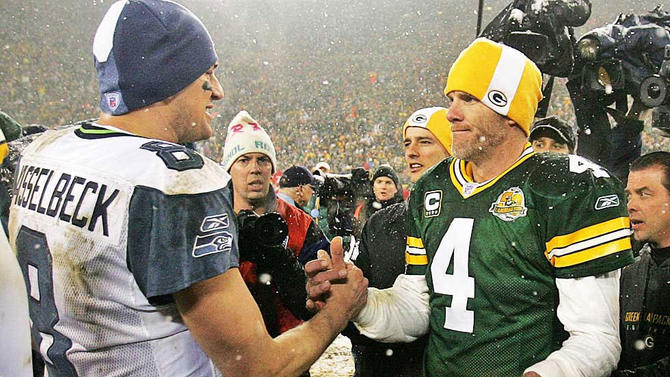
Mariucci: I had those three quarterbacks over at my house a lot, Mark, Ty and Brett. I have three sons, too. We had spaghetti, and we ate, then all of the sudden those three quarterbacks went downstairs in the basement with my three kids to play dodge ball. Gayle and I stayed up, we start clearing the table and doing dishes. We can hear them downstairs, yelling and having a good time, balls flying, hitting the walls. Just like a bunch of kids. Well all of the sudden, they shut the lights off. That was going to be the next part of this game. They're going to play dodge ball, with the lights out. OK? And then I hear, "Aaaaaah! You Son of a …!" I go, "Oh my god, somebody got hurt." We go run downstairs. Brett Favre hit Mark Brunell in the face with a dodge ball point blank. He had a welt on the side of his face. Probably could've took his eye out. Dodge ball. In the dark. Probably from 5 feet away. It was like, "OK, guys, game's over. Do we have to do this right now?" They were all a bunch of kids.
Pederson: When guys were down practicing special teams, he would take the rookies' clothes and tie them end to end in the locker room, like taking bed sheets and hanging it off the hotel balcony so you could climb down. Your socks were in one spot, your shirt was in the other, your underwear was in a spot.
Bono: He was always imitating someone. He could be walking by you and hear a comment and react to it and make the whole room laugh. He was always very light-hearted.
Brunell: He would impersonate guys that worked at the Packers facility, he would impersonate guys that he grew up with that we didn't know and didn't even know if it sounded like them, but it sure was funny. He did John Elway a lot, the pigeon-toed thing. He did a Marino, too. But the one that stands out was Elway. He could do Elway pretty good. Just the way he walked to the line of scrimmage and the way he talked, it was hilarious.
Detmer: He did Keith Jackson great. We were playing the Steelers in a preseason game and I had to go down early with the kickers because I was the backup holder. I'm out there, Mariucci comes out, and the quarterbacks are supposed to come out like 10 minutes after the kickers. I'm out there, and kickers get down, and no quarterbacks are there. Mariucci is kinda starting to pace, looking around. It's kind of a long way up the tunnel and around in Three Rivers Stadium there and Mariucci is looking at me, and I'm just laughing, like, "I don't know." Mariucci runs up into the tunnel, he's on a sprint. He comes back, and all three QBs are trotting across the field and Favre's just laughing, and Mariucci has this flustered look on his face, like, Unbelievable. I ask him, "What were they doing?" And he's like, "He's doing his freaking Keith Jackson imitation for everybody in the locker room."
Hasselbeck: Even the wild-card game that had overtime when I said to Ryan Longwell, like, "Hey, we want the ball, we're going to score," and it picked up on the referee's mic, if it wasn't that game, it was a game earlier. We go out for the coin toss and I have a winter hat on. And Brett says, "Oh, hey, did you hear what happened last night in Milwaukee?" I'm like, "What?" And he pulls my hat over eyes and goes, "The lights went out!" Like we're in elementary school. He was just always doing that kind of stuff with everybody, but me for sure.
Hasselbeck: The streak, it's just absolutely incredible. And the style of play. Eli Manning had a streak going, or maybe even Peyton, but to play like Brett, I've never seen him slide in the pocket. I've never seen him want to like throw the ball away.
Mariucci: I think any great player in any sport, he'd love to have on his resume that he's the first at something or the best at something or a record that's been held for a long time. Something that's really unique and exclusive to him. The Cal Ripken-kind of a streak is really important to him.
Hasselbeck: I backed him up for three years and people would say, "Oh, well, it's not like Brett Favre wasn't healthy and always hurt." Yeah, right. He was always hurt. He always had something. One year we played the Indianapolis Colts and I was sure I was starting. He didn't finish the game at Tampa, and I was just sure. I took every rep, getting ready to play. Brett's in a walking boot, he's on crutches. And on Friday's practice, he comes out with a size 15 shoe on his right foot, a size 13 or 14 on his left, and just hobbles around and practices on it. I'm like, "Are you kidding me, dude? You stole all the reps. I'm going to need all these reps for the game." And he sucked it up and played and played lights out. He threw a touchdown pass to Ahman Green underhand. It was just, he was amazing.
Pederson: A lot of times there were a lot of games that he probably shouldn't have started but he did and he battled through it. That's just Brett. That's just a compliment to him and his longevity. It's an amazing statistic. In today's game, the quarterback position is a little more protected. He played when some of the hits that you see today were not illegal.
Detmer: Just playing, week in and week out, was tough enough. But Brett had a little bit of a knack for, he was one of those guys, he'd make a throw and the first thing that would happen was he would kinda back outta there. We called it the crawfish. Steve Mariucci would be like, "There you go, crawfishing again." Kind of a Mississippi term. He'd throw, then kinda scoot back to avoid getting hit. That's when guys could lead with the top of head and they could hammer you. A little different nowadays. He had a pretty good knack for throwing and getting away.

Bono: If you could go back and watch every film, I think it would be rare to find a blasting hit on him. He was very good at making people miss. Yeah, I'm sure there are a few just knockdown hits, but I don't think there are as many as you would think in that 20-year career. Someone was chasing him or he would step up and be running, and someone would hit him from behind, and you'd think, God, he just got blasted. But then you'd watch it on film and you're like, Damn, yeah he got tackled, but how did he avoid the bigger blow?
Mariucci: The average human being or even the average quarterback would have missed many games in that 20-year career because of injury. And Brett probably should have, could have missed many of those games because of an ankle that's ballooned up so big you can't even tape it. Or ribs. Or his stomach. Or his shoulders. You name it. Oh, my god, he played a whole season with a broken thumb on his passing hand. Are you kidding me?
Hasselbeck: My fourth year I get traded to the Seahawks to be their starting QB, and I really felt like I could play, but I got hurt in training camp. What I really didn't know how to do was play hurt. And I didn't know how to play well hurt. Early in that year, I struggled. I was dealing with something like a hip flexor type thing. And I was like, "How on earth does Brett do this, year after year, game after game?" That was really absurd to me that he was able to do it. I just learned to have more respect for it. The 16 games, four preseason games, for sure playoff games, year after year, broken bones, injections. Whatever it was, he always got it done.
Mariucci: That quality in individuals should really be important to everybody, I don't care what you do. Where you don't miss work. You don't miss practice. You don't miss meetings. You're dependable, reliable, available. That quality was somehow embedded in him from his parents, that, if you're supposed to be somewhere, you better be there, whether it's baseball practice when you're a kid, or at dinner table. Or curfew. Whatever that is, be where you're supposed to be, do what you're supposed to do. Be dependable. That's why he refused to miss.
Doug Pederson: It just goes to his competitive nature. It's hard, I think, when you've played that many games and started that many games to just say, "I'm done."
Mariucci: The retirement-unretirement stuff, it got complicated with Green Bay. It got really weird. When he first retired, when he was crying there and he had a 78-minute press conference, he was reluctantly retiring. In the back of his mind, he didn't want to do it.
Bono: I think it was more that he just loved to play the game. He just didn't want to retire. He couldn't just decide. He loved it so much that he couldn't step away from it.
Mariucci: He felt they wanted him to, he felt that they made up their minds, but he didn't want to do it. He was saying all those things about, "It's time," and all that. There was little Brett Favre on his shoulders, saying, "You shouldn't be saying this because you know you don't want to retire. You know you can still play."
Hasselbeck: I don't know if it was the age thing as much as everyone was gone. I remember there were a few games in '99 when he'd bring them back and he'd be crying after the game or we'd be on the sidelines and we'd need a two-minute drill to win it and the fans would be behind the bench, like, "Oh, it's no problem, Brett, you got this. You're gonna just take us down and win it." The guys that he was doing it with, early on, the Sterling Sharpes and the Robert Brooks and the Keith Jacksons and Chmuras, those guys were gone. After '99, those guys were gone. Holmgren was gone, Mooch was gone, Andy Reid was gone. And now he's throwing to new guys. Now the greatness of that organization and Brett is that he kept doing it with those guys. He did it with a new coaching staff every year. That was a lot of pressure. You're still the guy and everyone expects the same level of play, you're fighting through injuries. He manned up, but it's hard to do, week after week, year after year.
Detmer: People were always asking, "What do you think Brett will do when he's done playing?" I'm like, "He's gonna play as long as he can because football is what he does." I don't think he knows. That's probably more scary for him and makes him more nervous than carrying the burden of the streak and the franchise on your back, because that's what he loves. When he's done and can't do it anymore, he's probably like, "What the heck am I going to do?"
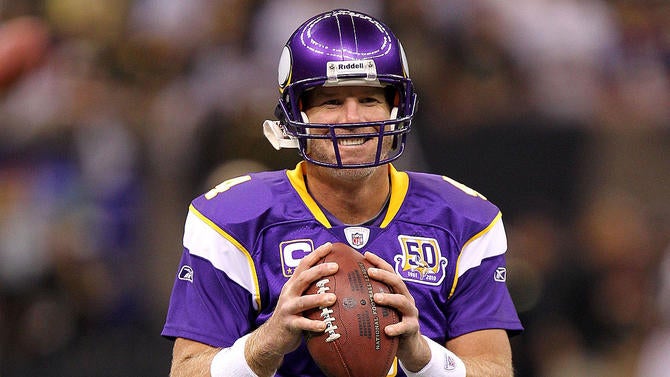
Hasselbeck: The new players would come in and they'd want Brett's autograph more than to be his teammate. You'd start to see him, he wouldn't shower in the player's showers. He'd go back and shower with the trainers. He was tighter with them than he was than the guys that were new. Some people would think, "Oh, he's too good to shower in here." No, he just needed some down time. I remember when Danny Wuerffel came, I was like kinda concerned about him, and I was like, "What do you think about Brett?" He was like, "Nah, man, I totally get it." Danny had been a major superstar. He was Tebow before there was a Tebow. He was like, "I remember after my junior year, Heisman Trophy front-runner, one of my favorite things to do in the world was to go scuba diving, and I would just float there. I would go under the water and it was just me and thousands of fish."
Pederson: At some point, would you like to say, "Hey, make a decision, retire or play." But for a guy that has played that many years and that long, I think he had sort of earned the right to wait as long as he needed to wait.
Mariucci: I knew that he wanted to play more. I knew that he wanted to play against the Packers. He wanted to show them that he could still play. I guess it got a little personal, like, "I gave you 16 years of my life, 16 good years, and was shown the door. I want them to know that I can play." He proved that. The Packers proved that they moved on and found another good guy in Aaron. I think all in all it was a win-win for everybody that Brett went elsewhere and showed other fans how great he was. Minnesota fans were thrilled to have him.
Hasselbeck: I told every young QB that came in to back me up, I told them the same two things he told me. First thing, he said, "We're going to have a blitz meeting and a run game meeting on Wednesday. Don't listen to anything they say because it's going to change by Friday." That was really, really good advice. The other thing that he said to me that I took to heart was, "Learn the names of every person who works in the building. It will make your time here in here so much more enjoyable." I just thought it was an interesting thing for the game's most popular player. I was at his Hall of Fame induction this year at the Packers' thing. That was the thing that everyone would say, was, "I can't believe how many names he knew. He knew middle names, even." It didn't even dawn on me, "Like, of course he does, that's who he is." Like I first got to know him, I'd call him Lorenzo. Brett knows everyone's name, their middle name, he just knows them.
Mariucci: I think the guys that apprenticed under him probably, if there's one thing that they learned from watching him, or being around him, is that he kept it fun. The most pressure-some position, the most demanding position in sports, let's face it, is the NFL quarterback. More so than the pitcher in baseball who's in a rotation. This guy's got every responsibility on him, every single minute of every single day and every game and every practice and every press conference. There's so much to it. That position in sport is unique. And, I think that everybody that played along with him, or under him, learned that he kept it fun. He kept it a game.
Hasselbeck: It's the craziest thing, that chin strap thing, I never did that. I never even made a conscious decision to do that, it just kinda rubbed off. The receivers used to fine me if my chin strap was off before the ball was completed. I'd throw the ball, and I'd be reaching for my chin strap. I don't know where it came from, but I see Aaron Rodgers do a lot of the same things.
Brunell: He played hard. He played the game how it was intended to be played. It wasn't always pretty. If you're down two touchdowns, and you've got six minutes left, there was no quit in Brett Favre. He was just going to keep fighting and fighting and try to make something happen. He played with such a passion. It was like he was out playing street ball with his buddies, just going out there and doing everything he could to win.
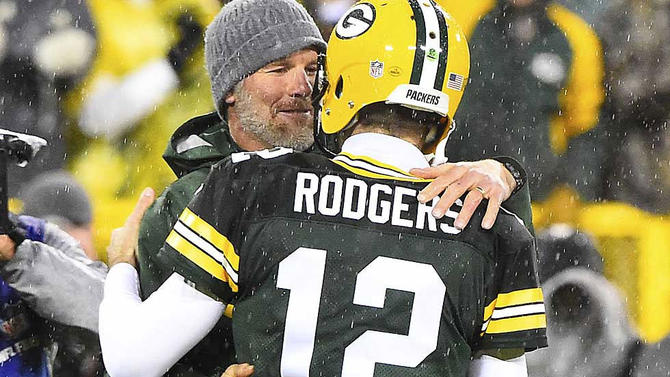
Mariucci: Yes, it's serious, yes it's a business, yes there's pressure. We get that. He found a way to balance all of that with having the time of his life with his teammates. He kept it in perspective. Some of that rubbed off on all these guys. They didn't see a grinder that was a worrywart. He put in the work necessary, then you go like heck and compete like heck and then have fun and enjoy your teammates. He enjoyed the pressure, enjoyed going into a crowd or going into a nasty environment on the road where people just hate your guts because you're so good. They learned that they watched him just enjoy that and love it. I would tell my kids, when they're 6, 8, 10, 12 years old, "Watch Brett, guys. Just watch that guy."
- Quotes attributed to Brett Favre in this story are from Favre's autobiography, "For the Record," unless noted.
- CBS Sports NFL Insider Jason La Canfora contributed to this story.


